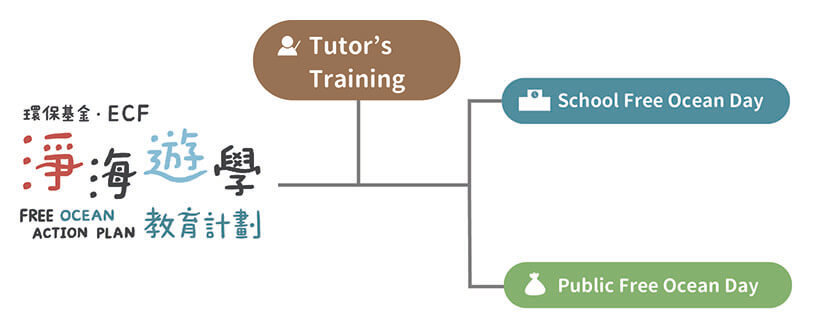Program brief information
ECF Free Ocean Action Plan is a environmental education and community engagement program funded by the Environment and Conservation Fund (ECF) and Environmental Campaign Committee (ECC). This program will first train up the tertiary students about the ocean and coastal ecology, marine debris, as well as environmental education skills and techniques. Then, allowing the tertiary students to lead the “Free Ocean Day” for community and school students, to expand the influence up to the public level, and further to raise the public awareness towards waste reduction at source and ocean conservation.
Program features
- Aiming at local coastal ecological hotspots as target locations for marine debris survey and shorelines cleaning, in order to explore the impact of marine debris on local ecology;
- The tertiary students’ tutor training program, including continuous knowledge and skills training, to cultivate a new generation of marine conservation pioneers;
- Comprehensive, complete, and diversified learning activities, including tertiary student training and Free Ocean Day, are added to the environmental education board game and outdoor learning elements;
- Educational and experiential activities cover tertiary, primary, and secondary schools and the members of public. To educate the public on the concept of waste reduction at the source, cultivate environmental-friendly living habits, and solve marine debris pollution in long run.


Program structure
ECF Free Ocean Action Plan officially started in December 2021, the eighteen-month period is divided into three parts: (1) Tertiary students’ tutor training program, (2) School Free Ocean Day, and (3) Public Free Ocean Day.


Tertiary students’ tutor training program
Throughout the program, there are three rounds of the tertiary student tutor training program. Each round includes two full-day training sessions and two days training day-camp.
The program has recruited local full-time tertiary students to become program tutors after receiving a series of professional training. The program equips tertiary students with transferable skills which will be further applied to lead the Free Ocean Day for School and community, participate in local marine environmental conservation work and solve the problem of marine debris pollution in the long run!
After completing the training, tutors must assist in completing at least three times of the Free Ocean Day.

The Program has ended successfully! Thanks for Support!
Program highlight






Free Ocean Day
Free Ocean Day is the main event of the program. This program hopes to use comprehensive, diversified, and interesting learning activities, such as game education and ecological field trip, to cooperate with shorelines cleaning and debris survey, and further promote the concept of waste reduction at source in daily life to primary and secondary school students and public. It is hoped to cultivate their environment-friendly living habits.
School Free Ocean Day
Free Ocean Day for School is a one-day activity, which suitable for Primary 4th to 6th grades and Secondary 1st to 3rd grades, The activity involves (1) Theme talk; (2) Environmental education board game; (3) Coastal cleaning and marine debris survey; (4) Coastal ecotour.
This activity has been completed. If you are interested in the above environmental education activities, please do not hesitate to contact us!




Free Ocean Day for Community
Free Ocean Day for Community is a one-day activity, which suitable for all walks of life. The activity involves (1) Theme talk; (2) Environmental education board game; (3) Coastal cleaning and marine debris survey; (4) Coastal ecological tour
This activity has been completed. If you are interested in the above environmental education activities, please do not hesitate to contact us!

Our contributions on Free Ocean Day!
Although our program was implemented in the worsening local epidemic situation, we still successfully held 17 Free Ocean Days. 443.6 kg and over 10,000 pieces of coastal litter were handled properly through great efforts employed by participants. The 5 most common marine litter are plastic bags, glass fragments, plastic bottles, polystyrene litter and drink bottle caps, accounting for 64.8% of the marine litter collected. To conclude, most of the coastal litter is plastic item.
The program was conducted in marine ecological hotspots, including Ting Kok East Seashore, Tseng Tau Coast (Three Fathoms Cove), Tai Tam Tuk, Pak Nai and Lung Kwu Tan, etc. All these hotspots are biodiversity-rich with unique species such as Ting Kok Tree Climbing Crab (Haberma Tingkok), endangered Chinese Horseshoe Crab (Tachypleus tridentatus) and Orisarma patshuni with Hong Kong as type locality, which warrant our concern and conservation.
According to the figures, the problems of coastal litter at Pak Nai and Tai Tam Tuk are comparatively more serious. Each visit requires participants to handle around 42.4 kg of coastal litter, mainly including plastic bags, glass segments and other plastic items. The problems reflect that the litter accumulation has disastrous effects on our marine biodiversity in these two marine ecological hotspots.




Little Pioneers on Ocean Cleaning Online Learning Activity
As the Education Bureau announced that since the epidemic situation was very severe, all schools suspended face-to-face classes and on-campus activities, our programme Free Ocean Day was unable to start. In response to students’ learning needs during the holiday and the period of “Suspending Classes without Suspending Learning”, we specifically designed and established a new set of online learning activities, Little Pioneering Groups on Clean Shorelines. Through interactive games and video-watching activities, primary students can learn more about local marine biodiversity and understand multiple threats to marine ecology.
This activity has been completed. If you are interested in the above environmental education activities, please do not hesitate to contact us!



This program has been completed. If you are interested in the above environmental education activities, please do not hesitate to contact us!
